By Paola Pascual on Aug 2, 2022 3:13:27 PM
"Judge a man by his questions rather than by his answers." — Voltaire
If you ask any of my friends what phrase defines me, that is “I’ve got a question!” I love asking lots of questions -as much as listening to what others ask. If you pay close attention, you will soon realize that asking good questions is a skill not everybody has mastered.
We spend most of our time at work asking and answering questions -requesting status updates from a colleague, questioning a client in a negotiation, requesting a report, defining impact of an L&D initiative, or finding out what a prospective client needs. But spending most of our day asking others for information doesn’t mean we’re good at it. Asking good questions takes time and practice.
And if you communicate with people from different cultures, it gets even harder. How do you ask questions in a way that is culturally appropriate? In this post, you will find a guide to asking better questions in cross-cultural workplaces. TL;DR? Check out the episode above for a quick summary.
Why is it important to ask better questions?

Asking good questions helps you build relationships, improve your emotional intelligence, and exchange ideas. Great questions help you learn, inspire curiosity and critical thinking, and challenge biases and assumptions. Oh, and asking questions improves your likability! This Harvard study identified “a robust and consistent relationship between question-asking and liking: people who ask more questions are better liked by their conversation partners”.
The ability to ask better questions will also benefit your team and your entire organization. They promote a good working environment and you will get to build rapport with team members, obtain valuable information from potential clients, and foster participation in meetings.
What makes you a good question asker?

What do we mean by "good question"? Quality questions are those that are relevant, clear, and concise. They have a purpose and stimulate thinking in a safe environment, without biases or assumptions. The best approach to asking good questions depends on the goals of the conversation. Are you trying to build a relationship, collaborate with the other person, uncover sensitive information from the other party, or a combination of them?
There are several important factors that help you ask higher-quality questions:
- Curiosity. You ask with the aim to understand, rather than judge.
- Preparation. You do your research and try to understand some concepts on your own.
- Intention. Your questions have a clear purpose and are designed accordingly, asked at the right time, and with an appropriate tone. You know what kind of information you need and who to ask.
- Courage. Some questions are hard, but you have the courage to ask them.
- Respect. Hard doesn’t equal rude. When asking questions, be mindful of cultural differences and people’s sensitivities and strive for respect and politeness.
- Psychological safety. A golden trait of good question askers is the ability to make the respondent feel that they can share and do what they want, without fearing their answers are not good enough, too weird, or out of place. This is called psychological safety.
What is a person who asks a lot of questions called?
Someone who shows interest in learning things and asks a lot of questions is inquisitive. Being curious is a strength that you should foster. Taking it too far can be seen as negative, but that doesn’t truly apply when you are in a context of learning and respect.
What makes a good question good?

Generally speaking, a good question gets right to the point. It is concise and descriptive, but not too wordy. When you ask a good question, the person that you're talking to understands exactly what you mean. They avoid confusion.
- It has a purpose
- It is specific and clear
- It is open-ended (it starts with why, how, what, when, where, which, or who)
- It does not lead the reader
- It surfaces and challenges assumptions (it is not biased)
- It is sincere and comes from genuine interest
- It generates curiosity in the reader
How can you start asking better questions?

Ask good questions across cultures
In multicultural situations, it’s always great to have a cultural interpreter. This can be a friend or a colleague that knows the other culture well. This go-to person is someone you can ask when you want to make sure you ask the right questions across cultures.
You also want to create the right mindset. Be as open to the answers as possible and be genuinely interested in the answer. When you ask about other cultures, include words such as “normally”, “typically”, and “usually”. This way, you make it easier for the other person to reply because you’re not pointing at them in a specific situation but asking in general terms.
For example, “What’s your general approach to handling conflict?” “How do you usually like to collaborate?”
Tip: Join one of our free webinars on cross-cultural communication.
Ask more questions

“I wish they had asked me more questions”.
“I can’t believe they didn’t ask me any questions.”
Did you know that these are among the most common complaints people make after having a conversation, such as an interview, a first date, or a work meeting? People don’t ask enough questions. The unfortunate side effect of not asking enough questions is that we make poorer decisions and we are less likable. Asking more helps you not only learn more but also make a better impression on others and improve your relationships with others.
But why do we not ask enough questions? We tend to jump to conclusions instead of asking more questions. We’re overconfident and think we already know the answers. We’re eager to impress others with our own ideas and stories. Sometimes, we’re just apathetic and don’t care enough to ask. Or, we just worry we’ll ask the wrong questions. We fear being viewed as rude or incompetent. However, being willing to ask “dumb” questions is, ironically, one of the smartest things you can do. Well, not always, but don’t be afraid to ask. Asking lots of questions is the best way to become a better question-asker.
A good rule of thumb is to proactively ask 5 questions before you add your story to the mix.
But ask one question at a time
When you ask several questions at the same time, you risk some questions falling through the cracks. It also makes it easier for the respondent to evade difficult questions. Keep it simple. Stick to one question at a time to ensure that you get all the information you need.
For example, instead of asking, "How do you usually handle this type of projects and when would you like to start?", try: "How do you usually handle this type of projects?" [wait for the answer], "And when would you like to start?"
Listen actively

A secret to asking better questions is to be a good listener. It is also an effective strategy for improving cross-cultural communication. Pay attention to what the other person says, don’t interrupt, and make eye contact. Stop thinking about what you are going to say next and be present. This helps build rapport and minimize misunderstandings.
Use the information you hear to craft your questions. Restate or summarize what the other person says to ensure you understood them correctly and ask frequent questions. Bake some of the words of your conversation partner into your questions to make them feel heard and increase the quality of their answers.
For example: “You just mentioned you wanted to start a new business. When do you plan to launch it?”
Ask questions in a casual way

Create the right context to ask questions. Especially if you are asking in a multicultural setting. A great context to ask questions is low-risk, informal, and relationship-oriented. People are more open and communicative when you ask questions in a casual tone, so avoid formal meetings and wait for a 1:1 session to ask.
A study by Leslie K. John found that, when asked a series of sensitive questions in an online survey, participants were twice as likely to reveal sensitive information on a site that looks fun and casual than on a site that looks official and serious. These findings suggest that adopting a more relaxed approach will lead to better results than sounding stiff and buttoned up.
For example, instead of asking “Which of these factors do you consider to be more significant with regard to your professional life?”, try “Which of these is more important for you at work?”
Ask questions in third person
Another way to ask questions in a way that feels more casual is to phrase them in third person. Instead of asking directly for a personal opinion, try asking what THEY think someone else’s opinion might be. Or ask what other people from their culture would think or do. This takes some pressure off and gives the other person the chance to share their opinion in an indirect way.
For example, “What do you think younger generations would think of this campaign?”
Ask open questions — but not always
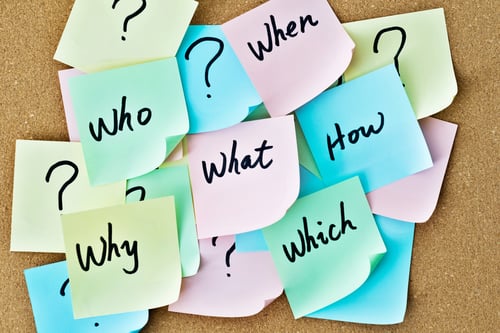
Open questions (or open-ended questions) are those that start with a WH-word (why, how, what, when, where, who). They do not expect specific answers but elicit a wide range of answers. They avoid the bias that may result from suggesting responses to individuals.
Open-ended questions open up the discussion and encourage problem-solving. They help you uncover information and learn something new.
For example:
- Instead of “Do you think you will finish the project tomorrow”, try “When do you think you will finish the project?”
- Instead of “Did you and Marian argue?”, try “What happened between you and Marian?”
Here are other examples of open-ended questions to ask in a multicultural workplace:
- “What are your thoughts about this method?”
- “When have you…? And how did it turn out?”
- “In your culture, how do people do this?”
- “What is it like to…?”
Tip: When asking open-ended questions, be explicit in your wording, especially if your question is part of a web survey.
Asking open-ended questions is generally a good idea, but there are situations where they may be less effective. In tense negotiations, for instance, open-ended questions can leave too much wiggle room for dodging sensitive questions or lying by omission. Correctly framed yes/no questions can lead to much better results in those instances.
Don't ask yes or no questions (most of the time)
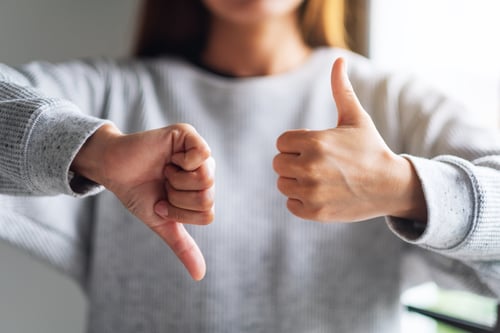
Closed questions (or close-ended questions) are specific and expected to be answered with a yes or no. They start with words such as “do”, “does”, “don’t”, “do you think”, “are”, “is”, “should”, and “would”.
In multicultural workplaces, avoid questions that expect a “yes” or “no” answer. In many cultures, it is difficult or embarrassing to say no, so you will always get a “yes” even if the real answer is “no”. And not only that! The word “yes” can have different meanings based on who you are talking to. In most Western cultures, such as France, Germany, or the United States, “yes” is a sign of agreement. When you reply affirmatively, you indicate that you agree with the other person or that you will commit to something. In some Eastern cultures, such as Vietnam or Japan, “yes” may just mean “I heard you”. They are not agreeing or committing. They may not have even understood the message. They are just acknowledging that they received the message.
For example, instead of, “Will the project be finished by the end of the week?”, try this instead: “When do you think the project will be finished?”
Be mindful of leading questions
Leading questions prompt a specific response and steer a conversation in a new direction. Closed questions often introduce bias and preconceived notions that may not be accurate. They tend to assume an answer and people who ask them often want to confirm an answer they already know. While they can be harmless in some situations, they can also be manipulative and leading. Try to limit the use of close questions to situations where you specifically want to avoid evasive answers.
For example, instead of “Do you think it’s a good idea to call him?”, try this instead: “Who should we call?” or “How could he help?”
Dig deeper with follow-up questions
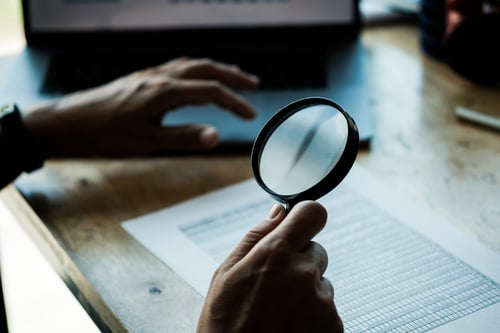
Follow-up questions seem to have a special power. They are the key to understanding people. Favor them. They signal that you are listening and interested. They make your conversation partner feel respected and heard.
The key to asking good follow-up questions lies in two main factors. The first one is listening. Pay close attention to how the other person responds to your initial question, and then build on their answer. The second one is curiosity. If you are scared of offending the other person, formulate polite questions that show that you are genuinely interested.
Here are three ideas to ask great follow-up questions:
A) Ask your original question again with a slight variation
Don’t be afraid to ask the same question twice, but do make sure you paraphrase it. Asking it again exactly the same might come off as confrontational. For example, if you first asked, “What communication skills would you like to work on?”, you can later phrase it as, “What are your main struggles in terms of communication skills?”
B) Link their answers
Tie responses to something they said earlier in the conversation. This tells the other person that you are truly listening, and you may even point out a connection that the other person may not have even seen yet. If you use this technique, remember that your goal is to synthesize -not interrogate. Avoid accusations like “But didn’t you say…?” or “But that’s not what you said earlier”.
C) Ask the question why
Out of all the open-ended questions, those that start with WHY have the strongest power. “Asking 'Why?' provokes reflection. Asking 'Why not?' drives innovation", says Nathan Young, marketing consultant and co-founder of 600 & Rising.
Why do we ask the question why? Asking why helps you dig a little deeper and learn more about a topic. It gives us clarity and helps us understand someone’s request and clear up any misunderstandings. And it connects us with others and helps us better understand others’ emotions.
Get into the habit of asking “why” and include different polite variations. How do you ask why in different ways?
- I’d like to understand [something] better, can you please explain why you chose to do that?
- What led to this decision?
- Would you be able to tell me the reasoning behind it?
- What is your hope?
- What would you like to see happen?
- What makes you say that?
Toyota’s Five Whys. Toyota also believed in the power of asking WHY. The goal of this method is to get to the nature of the problem by asking why five times, thanks to which the nature of the problem becomes clear.
Use silence to your advantage

While silence can be awkward in many cultures, don’t feel pressured to respond and ask quickly. It shouldn’t feel like a fast-paced conversation with a battery of questions non-stop. Pause and listen between answers. Get comfortable with silence. Give the other person time to think and yourself time to come up with better follow-up questions.
Ask the question. Wait for the answer. Listen to the response. Wait a bit more.
Many times, the person you are talking to has more information and would be willing to share it if you wait for it. Police and military interrogators know of the power of pausing. People feel they need to fill every silence and often end up overcommunicating to avoid any awkwardness.
Recap: 14 Quick Tips to Ask Better Questions Across Cultures
- 1. Find a cultural interpreter that can help you ask the right questions to your international peers. This person knows the other culture well and can teach you to ask questions that are culturally appropriate.
- 2. Create the right mindset. Be as open, sincere, and genuinely interested in what the other person is saying.
- 3. Include words such as “normally”, “typically”, “usually” when asking about other cultures. This takes some pressure off and makes it easier for the other person to reply. For example, “What’s your general approach to handling conflict?” “How do you usually like to collaborate?”
- 4. Ask more questions. A good rule of thumb is to ask 5 questions before you add your story to the mix.
- 5. Ask one question at a time.
- 6. Listen actively. Restate or summarize what the other person said and bake some of their words into your questions.
- 7. Ask questions in a casual way. Asking questions in an informal tone and in a low-risk, relationship-oriented context will help you get more honest answers.
- 8. Ask (difficult) questions in third person. If you want to ask, “What do you think of the new policy?”, try this instead: “How do you think the employees will react to the new policy?” [Note: There’s nothing wrong with asking questions directly using “you”, but you can mix it up with third-person questions.]
- 9. Ask open questions and be explicit in your wording. Instead of “Do you think you will finish the project tomorrow”, try “When do you think you will finish the project?” Instead of “Did you and Alex argue?”, try “What happened between you and Alex?” Instead of, “Do you like to work with a small team?”, try “What is it like to work with a small team?”
- 10. Avoid yes/no questions in multicultural workplaces. Some cultures don’t feel comfortable saying “no”, so you may not get a true answer by asking this type of question. Also, remember that “yes” can have different meanings based on who you are talking to. In Western cultures, “yes” indicates agreement, commitment, or understanding. In some Eastern cultures, “yes” may just mean “I heard you”.
- 11. Yes/no questions can be manipulative and leading, so try to rephrase them as open-ended. Instead of “Do you think it’s a good idea to call Ryan?”, try this instead: “Who should we call?” or “How could Ryan help?”
- 12. Ask yes/no questions to avoid evasive answers, for example, in a tense negotiation.
- 13. Dig deeper with follow-up questions. Three great ways to ask effective follow-up questions are: ask your original question again with a slight variation, link and synthesize their answers, and ask questions with why.
- 14. Embrace the silence. Give the other person time to think and craft their answers. You will notice that many people are willing to share more information if you wait for it.
Keep Improving Your Communication Skills for the Workplace
If you wish to take your professional English communication skills to the next level, get in touch with Talaera. Continue improving your communication skills for professional situations with our free resources.
For any additional information or questions, you can also reach out at hello@talaera.com. Interested in getting the best offers and receiving free content on Business English communication? Subscribe to our newsletter and we will keep you in the loop with offers, free events, and development materials!
If you enjoyed this article, keep reading:
- 8 Useful Ways to Make Your Point With Precision & Clarity
- How To Overcome The Top 4 Communication Barriers In The Workplace
- Does Your Accent Matter? Why You Should Focus On Cultural Awareness First
- 8 Tips On Direct Communication For Those Who Were Called "Too Direct"
- Working With Israelis? Use These 6 Excellent Communication Tips [Podcast]
- Working With Indian Teams? Practical Guide To Communication In India
- Win at Small Talk: Surviving the First 5 Minutes of a Virtual Meeting
- How Delegating Will Help You Grow And How To Do It Effectively
- Learn English Podcast
Talaera Talks - Transcript Episode 58
If you are learning English, including new English words and expressions will help you with effective communication. Remember to check out our other episodes on how to make small talk, how to deliver engaging presentations, how to speak English fluently, and many more: visit the podcast website. Listen to it on your favorite platform.
Intro
Welcome to Talaera Talks, the business English communication podcast for non-native professionals. My name is Paola and I am co-hosting this show with Simon. In this podcast, we're going to be covering communication advice and tips to help express yourself with confidence in English in professional settings. So we hope you enjoy the show!
Paola Pascual 0:24
Hi, my name is Paola and I'm back with a new Talaera Bit. If you ask any of my friends, what phrase defines me best? That is, I've got a question. I love asking lots of questions as much as listening to what others ask. But I tell you, if you pay close attention, you will soon realize that asking good questions is a skill not everybody has mastered.
Paola Pascual 0:51
We spend most of our time at work, asking and answering questions, requesting status updates from a colleague, questioning a client in negotiation, requesting a report, or finding out what a prospective client needs. But spending most of our day asking others for information doesn't mean we're good at it. Asking good questions, takes time and practice. And if you communicate with people from different cultures, it gets even harder. How do you ask for questions in a way that is culturally appropriate? Like how do you know and that's okay, so in today's Talaera Bit, I'll share 14 tips that you can steal, to ask better questions, in general, but in particular, across cultures. Ready? Here we go.
Paola Pascual 1:39
The first step is to find a cultural go-to person that can help you ask the right questions to your international peers. This person should be someone that knows the other culture well, and can teach you how to ask questions that are culturally appropriate.
Paola Pascual 1:57
Tip number two, create the right mindset. Be as open, sincere, and genuinely interested in what the other person is saying. So instead of coming or asking the question, with, you know, with assumptions, try to just be open to whatever they have to say.
Paola Pascual 2:17
Tip number three, include words such as normally typically, and usually, when asking people about other cultures are about tricky questions. This takes some pressure off and makes it easier for the other person to reply. For example, what's your general approach to handling conflict? Or how do you usually like to collaborate?
Paola Pascual 2:42
Tip number four, ask more questions. A good rule of thumb is to ask five questions before you add your story to the mix. Do you know what are the most common complaints people make after having a conversation like an interview, a work meeting or a first date? They are I wish they had asked me more questions. And I can't believe they didn't ask me any questions. So just make sure that you you ask a lot of questions to the other person, something we tend to like because it shows that you're interested. Right. So yeah, remember Tip number four, ask more questions.
Paola Pascual 3:24
But ask one question at a time. That way you make sure that although you get all the information that you need it. So instead of asking, how do you usually handle this type of projects? And when would you like to start, split that up and say, first, how do you usually handle this type of projects? Then you wait for the answer. And then you can ask, when would you like to start?
Paola Pascual 3:48
Tip number six, listen actively. We always say that to be a good communicator, you have to listen, and listen being present. So here when you're asking questions, restate or summarize, or the other person said, and then bake some of their words into your questions, right. So for example, oh, you just mentioned you want to start a new business. When do you plan to launch it? Perfect. Number seven.
Paola Pascual 4:19
Tip number seven. Ask questions in a casual way. Asking questions in an informal tone. And in a low risk context where you focus on the relationship will help you get more honest answers. So don't sound buttoned up into official and instead tried to be a little bit more casual and informal.
Paola Pascual 4:41
Tip number eight, ask difficult questions in third person. So if you want to ask what do you think of the new policy, perhaps it's a little controversial. Try this instead. How do you think the employees will react to the new policy? Now, there's nothing wrong with asking questions directly using you. But you can mix it up with these third question approach to get some honest answers.
Paola Pascual 5:12
Number nine, ask open questions and be explicit in your wording. This is a very, very big one, open ended questions are great. They are the ones that start with why how, what, when, where, who? And they they open up a new world of possibilities, and you're not just been pointing them to a yes, no question. So instead of Do you think you will finish the project tomorrow? Try? When do you think you will finish the project? Or instead of? Did you and Alex argue, try? What happens between you and Alex? Instead of Do you like to work with a small team? Try? What is it like to work with this small team? See the difference in their awesome.
Paola Pascual 6:05
Tip number 10. Avoid yes/no questions in multicultural workplaces. For two reasons. For tip number 10. The reason is because some cultures just don't feel comfortable saying no. So you may not get a true answer by asking this type of question. And also remember that even Yes, can have different meanings based on who you're talking to. Like in Western cultures, such as France, Germany, the United States, yes, typically indicates agreement, commitment or understanding. Yes, I agree. Yes, I understand. Yes, I will do that. But in some Eastern cultures, yes. may just mean, I heard you. This happened to me when I lived in Vietnam that I would ask, do you understand? And they would say yes. And that doesn't mean Yes, I understand. It means okay. I acknowledge that I heard something, or will the project be finished tomorrow? And I heard Yes. And it didn't mean yes, it will be done tomorrow. It meant Yes, I hear you. So just avoid frustrations by asking open ended questions.
Paola Pascual 7:16
Now, tip number 11 is how to avoid being manipulative and leading. And that is, again, by avoiding yes/no questions, and just try to rephrase them as open ended. So if you ask something like, do you think it's a good idea to call Ryan? That can be leading, but you can try this instead, Who should we call? Or how could Ryan help? If you want to ask about that specific person.
Paola Pascual 7:47
Tip number 12. Also about yes/no questions, but this time, I'm telling you do it. In what situations? Well, if you want to avoid evasive answers, like for example, in a tense negotiation? A Yes, no question is a good idea.
Paola Pascual 8:04
Number 13. One of my favorite tips is to dig deeper with follow up questions. Now we're adding blog article to the comments. So check it out. But with you know, with lots of examples and lots of tips, but here are three ways, three great ways to ask effective follow up questions. The first one is ask your original question, again, with a slight variation. And you can use this when, for example, part of your answer was in a part of your question wasn't answered. So you want to ask it again. Now, the important part is that you actually rephrase it, you ask it with different questions, otherwise, it can sound a little bit aggressive or confrontational. And here's an example. You know, for example, you want to ask, what communication skills would you like to work on? Let's say you're putting together your l&d Next l&d program. And again, you ask, what communication skills would you like to work on? If you didn't get the answer you were expecting? Or if you didn't get an answer, you can later phrase it as, what are your main struggles? In terms of communication skills? Same kind of information, different words.
Paola Pascual 9:26
The second way of asking great follow up questions is by linking their answers, so tie responses to something they said earlier in the conversation, and this tells the other person that you're truly listening. Now, if you use this technique, remember that you're not trying to interrogate or, you know, avoid accusations like Oh, but didn't you say or, but that's not what you said earlier, right? That's not your goal. Your goal is to synthesize to combine ideas And the third way to ask grateful out questions is by asking the question, why? Out of all the open ended questions, those that start with WHY have the strongest power. You know, they help you dig deeper, they help you learn more about a topic, they give you clarity, they help you understand someone's request and clear up misunderstandings. And it also helps you understand their emotions. And again, we said, words or questions that start with the word, why have the strongest power? You can ask why in different ways. Like, I'd like to understand something better. Can you please explain what led to this decision? Or would you be able to tell me the reasoning behind it? Or what's your hope? That's when you think why did you do that? Or why do you want to do that? We can ask, what is your hope? Or what would you like to see happen? Or instead of saying, Why did you say that which is great, you can also say, What makes you say that. And this is something that Toyota believes in, they use the Yodas, five why's and I don't know if you've heard it. But the goal of this method is to get to the, to the nature of the problem by asking why five times, and that way, the whole solution becomes much more clear.
Paola Pascual 11:30
And the very last step, we're very, very last one, number 14 is to embrace the silence, giving other person time to think you know, and craft their answers. We feel that often we feel that we need to fill every every gap, every hole every silence, but you will notice that many people are willing to share more information if you wait for it. So it's okay that if you ask a question, give them time to answer, listen to it, give them a little bit more time. And now the goal is not to make the conversation awkward, but to actually give people enough time to think about that what they want to say.
Paola Pascual 12:11
So this is all I have for you today. I hope you can steal some of these steps. I hope you learned something new. And again, check out the blog article that will go with this episode because there's so much content in there that you you know, you can get and a lot of examples that you can apply. Again, I hope you enjoyed it. And as always, keep learning.
Paola Pascual 12:37
And that's all we have for you today. We hope you enjoyed it. And remember to subscribe to Talaera talks will be back soon with more
Simon Kennell 12:45
and visit our website at talaera.com for more valuable content on business English. You can also request a free consultation on the best ways for you and your team to improve your communication skills. So have a great day and keep learning!
Outro
And that's all we have for you today. We hope you enjoyed it, and remember to subscribe to Talaera Talks. We'll be back soon with more! And visit our website at talaera.com for more valuable content on business English. You can also request a free consultation on the best ways for you and your team to improve your communication skills. So have a great day and keep learning!

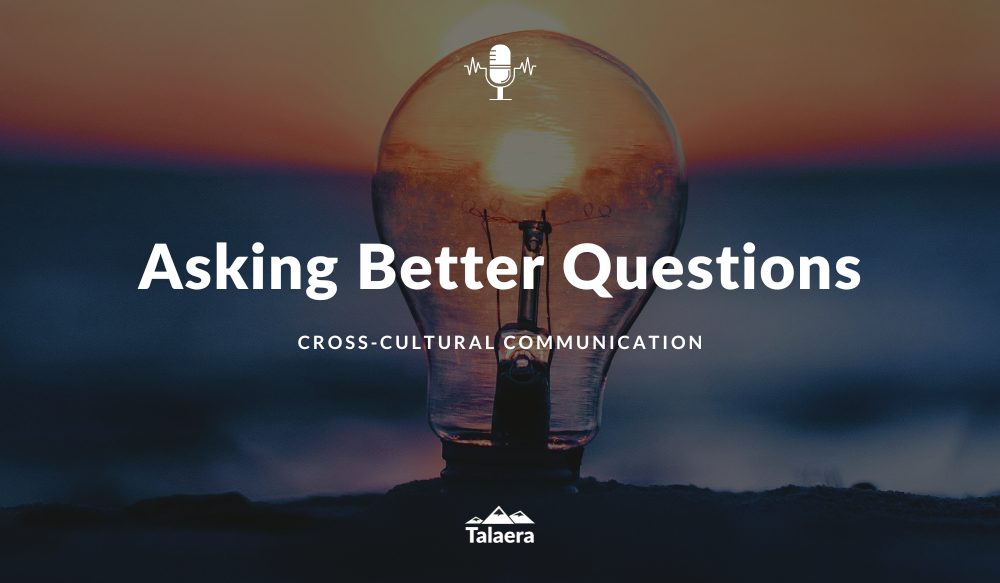
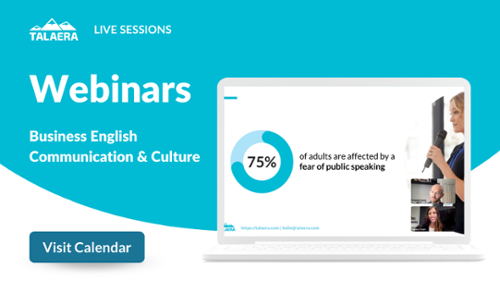

.png?width=200&name=listen-on-spotify%20(1).png)


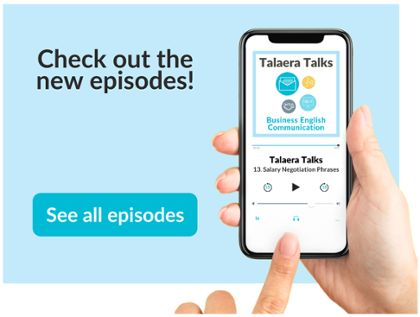
comments